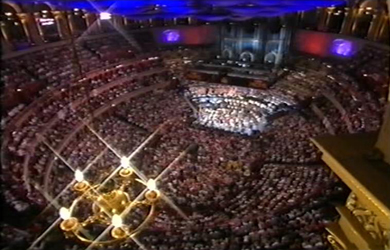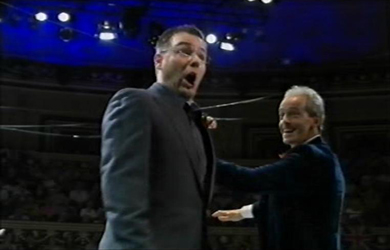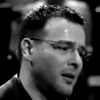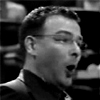 |
| home
site
map
contact |

PRESS REVIEWS


What are 'The Proms' ? History of the Proms Photographs here
The music on this page is Andreas Scholl singing Fairest Isle (text here) from Henry Purcell's King Arthur,
which he sang, accompanied by John Williams, at the Last Night of the Proms in London in 2005.
The recording level is low so turn your system's volume level up.
Please MAIL US NOW if you have rights in this music track and object to our using it. We will remove it immediately.
home
|
1 - The Times |
| Waves
stilled by calm of countertenor review by Richard Morrison |
|
SHIVER his timbers! Heaven knows what Sir Henry Wood would have said, had he imagined that the biggest cheers at the Last Night of his Proms would go not to his sturdily patriotic Fantasia on British Sea Songs but to a young German chap, warbling in falsetto. Actually, I think he would have been as awestruck as the rest of us. Andreas Scholl has the world's most cultured counter-tenor voice. And during his three Handel arias, some 6,000 people scarcely dared breathe, let alone pop balloons, beep hooters, toss streamers or perpetrate any of the other prepubescent japes that make the Last Night the, er, unique occasion that it is. After Scholl returned in the even noisier second half and pulled off the same trick with a pianissimo folksong and a Purcell air, I would have backed him to have walked on water. Which would have been appropriate, because this Last Night was the apotheosis of the maritime theme of the 2005 Proms. Thus the BBC Symphony Orchestra opened with a scintillating whizz through Walton's salty Portsmouth Point overture under Paul Daniel -conducting his first Last Night of the Proms with an appropriately British sense of irony. And the jaunty nautical spirit continued in Constant Lambert's jazzy choral work The Rio Grande (Paul Lewis dazzling in the skittish piano part, with the BBC Singers and Symphony Chorus in top form) and Erich Korngold's rumbustious score for that Errol Flynn swashbuckler, The Sea Hawk. Nothing to do with the sea, but in the show anyway, were Rodrigo's Concierto de Aranjuez, stylishly delivered by John Williams, and an avant-garde orchestral piece: Scherzi by Simon Bainbridge. That probably wins this year's Harrison Birtwistle Prize for alienating record numbers of BBC One viewers. But in the Albert Hall it was fast enough, weird enough and short enough to hold the attention. And so to Wood's Sea Songs, this year with their five preparatory bugle calls not only restored but echoed at simultaneous outdoor Proms in Manchester, Glasgow, Swansea, Belfast and Hyde Park, and relayed back to the Albert Hall. Preposterous BBC showmanship, yet Sir Henry would have relished that too. If he hadn't been a showman, he would never have invented the Proms. copyright
© 2005 The Times |

| 2 - The Guardian |
| review by Tom
Service |
|
This year's Last Night of the Proms was a pageant of sea-faring Britishness, the climax of the nautical theme that has run throughout the whole season. Conductor Paul Daniel, making his debut in charge of the Last Night, and joining an elite group of British maestros to have led the Prommers in their annual jingoistic jamboree, proved himself a versatile musician as well as a witty raconteur. It's fitting that a Proms season that has shored up core traditions, but which has failed to entice audiences to new or challenging music, should end not with a world premiere but with a triumph of interactive technology. Before Henry Wood's Fantasia on British Sea-Songs, bugle calls once used in Britain's naval battles were relayed from the simultaneous Proms in the Park events around the country into the Albert Hall. Like the whole of the Last Night, it was a quaint attempt to connect an older, idealised Britishness with the modern world. However, before the music disappeared in the traditional second-half orgy of balloon-popping and whistle-blowing, the Prommers were treated to some luxury casting in the evening's solo numbers. Paul Lewis, usually the most cerebral of pianists, was the flamboyant soloist in Constant Lambert's The Rio Grande. Lewis launched into the virtuosic piano part, and with mezzo-soprano soloist Karen Cargill, the piece sounded fresh, energetic and even moving, especially in Lambert's serene evocation of the Rio Grande's journey into the sea. Guitarist John Williams played Rodrigo's Concierto de Aranjuez with aching tenderness, but it was counter-tenor Andreas Scholl who stole the show with his performances of three Handel arias. Accompanied by the BBC Symphony Orchestra, who managed a passable imitation of a period instrument group, Scholl's purity of tone created a startling musical intimacy, even in the party atmosphere of the Last Night. Still more ravishing was his singing of Down by the Salley Gardens, accompanied only by the gossamer threads of Williams's guitar. Daniel carried off the rituals
of Wood's Sea-Songs, Land of Hope
and Glory and Jerusalem with
aplomb,
even if this was more an exercise in crowd control than musical
subtlety. He talked of the diversity of the Proms season and of music
as a metaphor for cultures joining together. However, the Last Night
presents the narrowest possible conception of British identity. With
its football-crowd fellowship of flag-waving, the Last Night turns
relics of Britain's imperial past into postmodern kitsch. It's all good
fun, but the danger is that its increasingly fogeyish traditions have
nothing to contribute to contemporary Britain, or to say about the
realities of the world around us. copyright
© 2005 The Guardian |
| 3 - The Daily Telegraph |
| review by Ivan Hewitt |
|
"Wider still and wider,'' it says in Land of Hope and Glory, a line that may no longer be true of the British Empire but certainly is true of the Last Night of the Proms. On Saturday, the vast, flag-filled, balloon-"Wider still and wider,'' it says in Land of Hope and Glory, a line that may no longer be true of the British Empire but certainly is true of the Last Night of the Proms. On Saturday, the vast, flag-filled, balloon-popping space of the Albert Hall became even bigger, as the simultaneous satellite events in Manchester, Belfast, Glasgow, Swansea and Manchester were beamed on to two large screens. ''Let's all say: 'HELLO GLASGOW','' said conductor Paul Daniel and, of course, we obeyed. This was Daniel's first go as Master of Ceremonies of the Last Night, and I had misgivings. He lacks the ample girth and natural joviality that goes with the role, being slender, intense, and much given to speaking in convoluted sentences. As it turned out, he judged the tone remarkably well. Daniel knows that sophistication is out of place. You can say anything on that podium and everyone will cheer. It's that kind of Christmas Panto silliness that infuriates some people about the Last Night, but part of its appeal is that powerful emotion and silliness sit cheek by jowl. Those emotions have little to do with the ''serious'' musical content of the evening, which is normally corralled safely into the first half. But some welcome moments of calm and concentration were mixed in with the fun. It was good to hear a contemporary piece (Simon Bainbridge's Scherzi) that fizzed with intellectual and bodily energy; good, too, to hear Andreas Scholl and John Williams perform Purcell's apostrophe to England, Fairest Isle, which as well as being beautiful in itself gave an extra fervency to our singing of Jerusalem. As Blake's
words echoed round the hall, one felt
a surge of - what exactly? Patriotism, certainly, but the presence of
dozens of foreign flags brought something else; a togetherness, a
feeling that the aspiration that flows through the entire season of the
Proms had found its natural climax.popping space
of the Albert Hall became even bigger, as the simultaneous satellite
events in Manchester, Belfast, Glasgow, Swansea and Manchester were
beamed on to two large screens. ''Let's all say: 'HELLO GLASGOW',''
said conductor Paul Daniel and, of course, we obeyed. copyright ©
2005 The Telegraph |

| 4
- The Financial Times |
| review
by Richard
Fairman |
|
How do they do
it? Other concert-hall promoters must be gnashing their teeth as the
BBC Proms again clocks up an impressive year of achievement in spite of
a summer when it seemed that outside events might for once make the
"world's biggest music festival" come a cropper. copyright ©
2005 The Financial Times |
| 5
- The Independent |
| by
Rob Cowan |
|
Each generation
finds an operatic voice to take to its heart. Pavarotti was the last
and Andreas Scholl may well be the next - and the first
countertenor to achieve wide-reaching acclaim. No one drew
louder
cheers from promenaders at the Last Night, a justly earned accolade. copyright ©
2005 The Independent
|

Fairest
Isle, all isles excelling,
Seat of pleasure
and of love,
Venus here will
choose her dwelling,
And forsake her
Cyprian grove.
Cupid from his
fav'rite nation
Care and envy
will remove;
Jealousy that
poisons passion
And despair that
dies for love.
Gentle murmurs,
sweet complaining,
Sighs that blow
the fire of love,
Soft repulses,
kind disdaining,
Shall be all the
pains you prove.
Ev'ry swain
shall pay
his duty,
Grateful ev'ry
nymph
shall prove,
And as these
excel in
beauty,
Those shall be
renown'd for love.
Text
by John Dryden